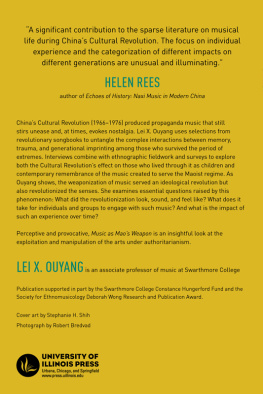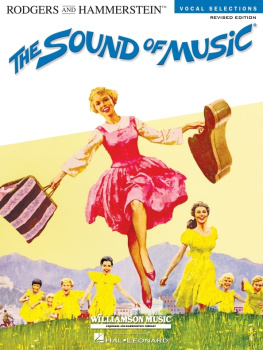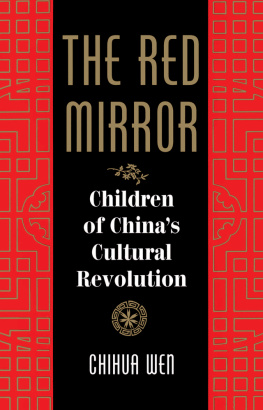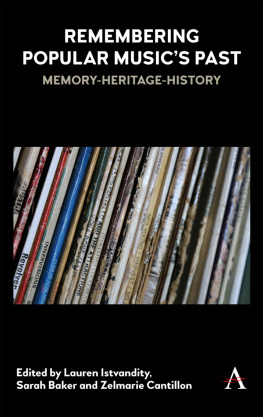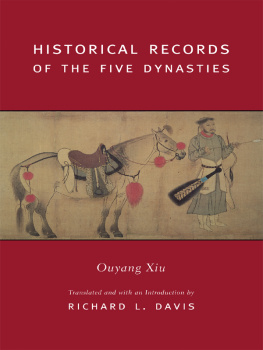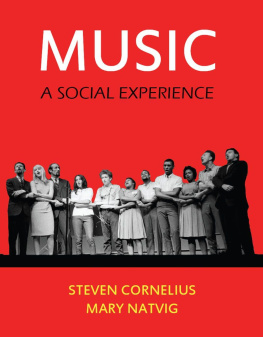Contents
1
RESEARCHING THE BATTLEFIELD
When people in (or originally from) China learn that my research focus is the music of the Cultural Revolution, the most common reaction is laughter. Sometimes the laughter is nervousthis music is not a common topic of discussionand other times it reflects the fact that these songs have often been considered the worst music in Chinese history. The art of the Cultural Revolution is often deemed unworthy of serious analysis because of its regressive politics. But when I start talking about the individual songs, a certain light comes into many respondents eyes, the songbooks clearly sparking some memories. When I first listened to the songs in 2001, when I was a graduate student, their lyrics sounded like blatant political propaganda, devoid of any human emotion to me. I did not directly experience the Cultural Revolution myself, but as I spoke with my respondents about the songs, I started to observe patterns of deeply emotional and personal connections to the music. I was initially surprised to discover how the songs could trigger emotionally heightened memories that were completely estranged from the political campaigns that created them.
As I began to research Cultural Revolution music, an obvious starting point was the politics of the music and the context within which the music was created and disseminated. I quickly learned of one of Mao Zedongs () leading cultural policies informing Cultural Revolution propaganda, one in which music was to serve as a weapon in the ideological endeavor of transforming China into a socialist society. As I interviewed musicians, editors, scholars, and individuals who experienced the Cultural Revolution firsthand, two additional themes emerged: the significance of childhood and generational imprinting, set within a broader discussion of memory. Researching the Cultural Revolution decades after its end placed this work squarely within one of memory, particularly on the topic of music and its impact. This research relied almost entirely on ethnographic fieldwork and thus conversations occurring in a contemporary moment about the past. The current manuscript is organized around these three large themes: politics, childhood, and memory.
Music as Maos Weapon ultimately considers the questions Why music?, Why does this matter today?, and What can we learn? After moving through the politics of the time period, the particular impact on individuals who experienced the Cultural Revolution as children, and the contemporary memory of the period, my attention turned to the particular combination of extremes during the Cultural Revolution. While the period is well known for the political, historical, and cultural extremes, including violence and trauma, I argue that it was also a sensory environment of historic extremes. The weaponization of music and the totalitarian dissemination of political propaganda arts was not merely a political or ideological revolution but also a revolution of the senses. Understanding the legacy of Cultural Revolution music today offers insight into the impact of exploitation and manipulation of music.
One Day at Lunch
The Great Proletarian Cultural Revolution (Wuchan jieji wenhua dageming ), or Cultural Revolution for short, is most commonly understood as a ten-year period of chaos in China that lasted from 1966 through the death of Mao Zedong in 1976. The impact of this period lingers on in contemporary China, but each individual who lived through this time remembers, reconstructs, or imagines the Cultural Revolution differently. A researcher of the Cultural Revolution must attempt to disentangle personal memories, emotions, and politics in the field while simultaneously negotiating issues of identity and ones own role as a researcher. I take inspiration from Tomie Hahns reflexive approach to fieldwork, analysis and writing as a path to comprehend the complexity of embodying the halfieperformer-researcher and impart it to others (2006, 94). As a multiracial Chinese American ethnomusicologist conducting fieldwork in China and the United States, I have found that my research has been shaped by the challenges that are unique to the contemporary memory of the Cultural Revolution and the postCultural Revolution context. As Lila Abu-Lughod writes, Feminists and halfie anthropologists cannot easily avoid the issue of positionality. Standing on shifting ground makes it clear that every view is a view from somewhere and every act of speaking a speaking from somewhere (1991, 141). As such, I turn first to the story of my own fieldwork to make transparent the reflexive ethnographic approach.
I spent the summer of 2001 in Beijing, China, at the Music Research Institute of the Chinese National Academy of Arts (Zhongguo yishu yanjiuyuan yinyue yanjiusuo ). As a visiting scholar, I met with professors regularly and explored the wealth of materials that were available in the library and archives of the institute. The main purpose of my visit was introductory researchan attempt to familiarize myself with the institute and its scholars in the hopes of designing a research topic for my doctoral dissertation. One day I was invited to lunch with some of the leading academics and administrators at the research institute and was introduced as the Chinese American scholar from the United States who was attempting to develop a research topic. As ideas started bouncing back and forth, one professor suddenly stopped the conversation and definitively said, I know the perfect topic for you; nobody has dared to touch it yet, and you are the perfect person for it.
This academic proceeded to tell me about an anthology of revolutionary songs titled New Songs of the Battlefield (Zhandi xinge ) that was published during the latter half of the Cultural Revolution. Despite the widespread dissemination of these songs during the Cultural Revolution, scholars had not yet focused on them. The academics at the Music Research Institute felt that I had a unique position: as an American, and someone who did not experience the Cultural Revolution, I had a political and emotional distance. Furthermore, as a Chinese American, I shared a heritage and possessed a basic language fluency that could help facilitate connection, trust, and rapport with respondents about a sensitive time and topic. I could straddle the line between insider and outsider to gain access that may have been otherwise difficult to obtain. My nationality (U.S. citizen) and place of residence (the United States) provided a perceived safe distance from the politically sensitive climate in China, while my ethnicity (multiracial Chinese and white) and language skills (Mandarin Chinese) provided opportunity for a closer connection. Sure enough, these aspects of my identity (nationality, race/ethnicity, language skills) would be brought up during every single interview that I conducted.
During the summer of 2001 and the winter of 20023, I began meeting with scholars in residence at the Music Research Institute, learning the basics of the five-hundred-plus songs included in the anthology. I also began learning more about the historical, political, and musical context of the songs in order to understand the lineage and processes leading up to this large and influential body of music. I returned to China during the summers of 2005 and 2007 for additional meetings with scholars and musicians who worked on the anthology as well as with individuals interested in speaking with me about their experiences during the Cultural Revolution. Since embarking on the project in 2001 I have also conducted research from the United States on the topic, including interviews with individuals who moved to the United States at some point after the end of the Cultural Revolution.
New Songs of the Battlefield

